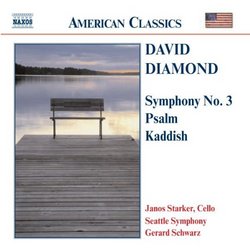| All Artists: David [6] Diamond, Gerard Schwarz, Seattle Symphony Orchestra Title: David Diamond: Symphony No. 3; Psalm, Kaddish Members Wishing: 0 Total Copies: 0 Label: Naxos American Release Date: 4/15/2003 Album Type: Original recording reissued Genre: Classical Styles: Historical Periods, Modern, 20th, & 21st Century, Symphonies Number of Discs: 1 SwapaCD Credits: 1 UPC: 636943915523 |
Search - David [6] Diamond, Gerard Schwarz, Seattle Symphony Orchestra :: David Diamond: Symphony No. 3; Psalm, Kaddish
 | David [6] Diamond, Gerard Schwarz, Seattle Symphony Orchestra David Diamond: Symphony No. 3; Psalm, Kaddish Genre: Classical
|
Larger Image |
CD Details |
CD ReviewsDiamond's Precious Gems J Scott Morrison | Middlebury VT, USA | 06/04/2003 (5 out of 5 stars) "David Diamond (b. 1915), along with the even older Elliott Carter, is one of the two remaining giants among American composers who came into their maturity between the world wars. These performances were originally recorded for a series of Diamond orchestral works from Delos Records, with Gerard Schwarz conducting the Seattle Symphony. Unfortunately, one gathers that series was curtailed because of economic pressures; if I'm not mistaken Delos is no more. Naxos is doing a major service by picking up what there is of this series and re-releasing them at budget prices. For some reason the content of these Naxos CDs is not arranged as it was on Delos. For instance, the Third Symphony and Kaddish were together on Delos, but not coupled with the Psalm. The pieces span much of Diamond's composing life: the Psalm is from 1936, the Kaddish for Cello and Orchestra from 1987. The latter, composed for Yo-yo Ma and played here by cello superstar Janos Starker, is immediately attractive and given a superb performance. What is it about thematically Jewish music and the cello? One immediately thinks of Bloch's Schelomo and Bruch's Kol Nidrei. The Diamond Kaddish is a worthy addition to that group. Psalm is a short (eight minutes), mostly quiet, spare piece which doesn't have to shout to make its intensity felt.The Third Symphony, one of my favorites of Diamond's symphonic output, was written in 1945 and given its premiere five years later by Charles Munch and the Boston Symphony. It is consistently tonal, even austerely Romantic, in language, and has memorable melodies, infectious rhythms, masterful orchestration, and an inventive but not daunting harmonic language. The decisive first movement is in sonata form. The following Andante is lightly scored and makes much use of chambermusic-like scoring, featuring harp, piano, flutes. The Scherzo is energetic and driven forward by rushing strings and winds and by an active part for the snare drummer. The Finale is lyrical, elegiac and has a sumptuous middle section featuring oboe and clarinet. There are thematic ties among all four movements. This symphony deserves to be a repertory work for American orchestras, in my opinion. The performances are all one could ask. Clearly Schwarz and his orchestra are on friendly terms with Diamond's style and it is unlikely these works will receive better recordings any time soon. I am so pleased that Naxos is including these works in its acclaimed American Classics series. Highly recommended. Scott Morrison"
|

 Track Listings (6) - Disc #1
Track Listings (6) - Disc #1